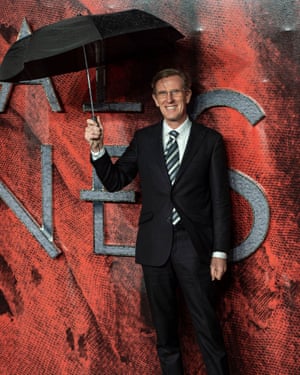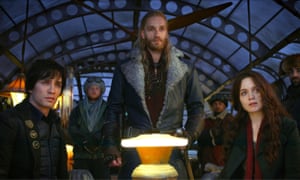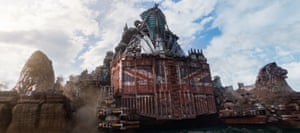Philip Reeve is reluctant to concede that his children’s book series about titanic mobile cities roaming a post-apocalyptic wasteland to hunt and devour each other is a bit weird. “People do seem to find it a hard idea to grasp, but I never did,” the author says. “I suppose it is a little strange.”
Mortal Engines, now in cinemas almost two decades after Reeve’s first instalment hit shelves in 2001, takes place centuries after the dust has settled on a cataclysmic global war. Civilisation has rebuilt itself around the tenets of so-called “Municipal Darwinism”: a survival-of-the-fittest technological ecosystem that sees whole cities mounted on outsize tank tracks, picking off and consuming smaller, slower towns for their metal, fuel, and flesh. It’s eat or be eaten.
Reeve was living in Brighton and wanting to write “some kind of big fantasy novel” when the idea came to him. The inexorable urban sprawl of his home town, and “watching it expand into the little towns and villages around it that I had known as separate places when I was a kid”, inspired the core concept. At the time – the mid-90s – his idea for a “retro, vaguely Victorian alternate world seemed fairly fresh territory”. Mortal Engines pre-dated the steampunk explosion; Reeve was unaware of the term at the time.
“Eventually I knew the look of [the world], had some characters in mind, but it just needed a big thing to hold it all together,” says Reeve. “A moving city was just the biggest thing I could think of! To find a reason to make it move, I decided it would be hunting other cities. That seemed like an idea.”

The film adaptation arrives at a time when blockbuster cinema is obstinately risk-averse. A $100m (£79m) film that isn’t a sequel nor franchise entry is no sure thing, but Reeve, who was not involved in the film’s production and hadn’t seen it at time of interview, isn’t worried: “I think the appeal is that it’s a really strange concept, but in a paragraph you can have it seem perfectly plausible. I imagine the film will find a way of doing that as well.”
It certainly feels like the right time for the world of Mortal Engines to be revisited. Reading the book as a 13-year-old, I was enthralled not only by the extraordinary concept at its heart, but also by its world-ending super weapons, deadly cyborgs and soaring airships. In under 300 pages, young protagonists Tom Natsworthy and Hester Shaw uncover a plot by London – the original traction city – to unleash a new weapon on the world and are hurled at breakneck speed through a series of spectacular set pieces worthy of big screen treatment: they are captured by slavers, hunted by the half-machine, half-corpse Shrike, and team up with class warrior pirates, before joining a resistance movement against Municipal Darwinism.
Only recently, after rereading it, did I come to see telling parallels between Reeve’s world and ours. Humanity has created a world that is fundamentally unsustainable and teetering on the edge of breaking point. It’s easy to see in the novel the destructive hallmarks of late capitalism: environmental devastation; over-reliance on non-renewable energy and untenable farming practices; healthcare that values profit over patients; apathy toward a democratic system we assumed was fair but now see is easily manipulated. A society, eating itself (literally, in Reeve’s novel) for the short term gain of the few, over a sustainable future that benefits us all.
Reeve answers this hypothesis with the wince of an author who is used to hearing elaborate readings they never intended. “Anything that’s any good is going to reflect society in some way. It has to have some purchase on real life. I’m happy for people to see whatever they want in it,” he says. “But I’m more or less a fan of capitalism. I wouldn’t want to be taken as some kind of anti-capitalist warrior.”

Mortal Engines is also about humanity’s failure to learn from history. To gain an advantage over its rivals, London aims to rebuild one of the super-weapons that almost rendered humankind extinct centuries before. The civilisation that built these weapons (presumably ours) is present now only in legends and half-truths. Our hero, Tom Natsworthy is an apprentice historian – a profession largely derided by traction London’s populace – when he discovers his city’s disregard for the lessons from the past. And the film contains a number of nods to politics today. “Going into Europe was a mistake,” laments the mayor of London archly as his city thunders across the continent, while several decks below the refugees from a recently eaten town are welcomed into the city with open arms.
For Reeve, history is “a great river that goes on and on, and people have their little moment paddling against the current before being swept away”. In this way, Mortal Engines is realistic; Tom and Hester are just two individuals who mostly remain unable to change the grand events of the story. “Most fantasies are basically wish fulfilment plots, where the main character does something heroic and changes the world in some way,” says Reeve. “Tom and Hester don’t have much chance to influence them, except on their personal level of survival.”

Traction London on film is a hulking hotchpotch of the supposedly quintessential British icons usually reserved for tourism posters: red phone boxes welded to deck plates, Big Ben grafted onto a museum roof, the London Eye repurposed as a mass transit system. It’s a nightmare version of the idealised UK history to which some today wish to return. The city’s stubborn refusal to let go of its past raises the interesting question: where would Municipal Darwinism end if allowed to continue unchecked? It would leave one lonely, hulking city grinding to a halt on a desolate wasteland, no prey left to pursue. Its people would have two options: see sense and settle down to build a different future, or break the city into mobile suburbs and begin the process again. Reeve himself thinks the latter: “Presumably it does go on. There’s going to be some die-hards out there who can’t let it go.”
Two decades after it was written, Mortal Engines has come to be an apt metaphor for where we could be heading: a powerful few trapping the rest in a deadly loop of stale ideas, with ordinary individuals helpless to break the cycle. The film, which deviates a little from its source material, instead chooses to end on a note of hope for a better future. Whether we follow remains to be seen.
• The Mortal Engines quartet by Philip Reeve is published by Scholastic. All the Lonely People by David Owen is published in January 2019 (Atom, £7.99)